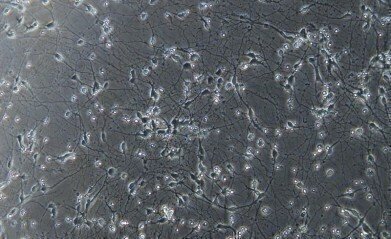-
.jpg) Rickie Patani
Rickie Patani -
 Motor neurons grown from iPS cells in the lab, viewed down a microscope. Credit: Jasmine Harley
Motor neurons grown from iPS cells in the lab, viewed down a microscope. Credit: Jasmine Harley
News & Views
Pioneering Techniques Win NC3Rs Approval
Mar 28 2019
Crick scientist Rickie Patani has been awarded an international prize for pioneering stem-cell techniques that reduce the need for animals in motor neurone disease research.
Awarded by the National Centre for the Replacement, Refinement & Reduction of Animals in Research (NC3Rs) and sponsored by GSK, it recognises Rickie’s use of patient-derived stem cells to better understand the disease and screen potential therapeutics without relying on animal models.
Motor neuron disease, also known as amyotrophic lateral sclerosis (ALS), affects around 5,000 adults a year in the UK and is characterised by a progressive degeneration of motor neurons in the brain and spinal cord that ultimately leads to death. Around 10% of cases run in families.
Research into ALS has historically relied on the use of animal models, particularly mice, with around 250 papers a year reporting in vivo studies. While this research has been important for understanding disease biology, the models are often poorly characterised, do not recapitulate the sporadic form of the disease (which makes up 90% of cases) and the disease phenotype can differ between mice and humans.
Rickie’s team take a different approach, collecting skin samples from ALS patients and healthy controls and turning them into stem cells capable of becoming any cell type. Then using chemical cues, they guide the stem cells into becoming motor neurones, or supporting cells, that can be studied in a dish.
This so-called ‘induced pluripotent stem cell’ (iPSC) approach has several scientific benefits over mouse models, including the ability to reflect the genetic diversity of patients, investigate sporadic forms of the disease (which represent 90% of the cases) and allow early molecular events to be studied.
The robust iPSC differentiation protocols developed has already enabled three groups in the UK to shift some of their research from animal models.
Rickie said: “I’m honoured and grateful to receive this award for our efforts to develop human iPSCs of neurodegeneration. The lead first author of this work was my first ever PhD student, Dr Claire Hall, who helped to build on prior insights made during my own PhD and postdoctoral research. A decade after this work was started, I’m delighted to see that our models are now being widely adopted across several laboratories at UCL Queen Square Institute of Neurology, the Francis Crick Institute and beyond.
“I’d like to thank these colleagues for their confidence in our iPSC models, research vision and for their shared commitment to the 3Rs. Crucially, this model will serve to reduce and in some cases replace, the use of animal models. The overarching vision of my research group is to use these motor neuron and astrocyte models to identify and study the earliest molecular events that lead to ALS.”
Digital Edition
Lab Asia 31.2 April 2024
April 2024
In This Edition Chromatography Articles - Approaches to troubleshooting an SPE method for the analysis of oligonucleotides (pt i) - High-precision liquid flow processes demand full fluidic c...
View all digital editions
Events
Apr 28 2024 Montreal, Quebec, Canada
May 05 2024 Seville, Spain
InformEx Zone at CPhl North America
May 07 2024 Pennsylvania, PA, USA
May 14 2024 Oklahoma City, OK, USA
May 15 2024 Birmingham, UK

















